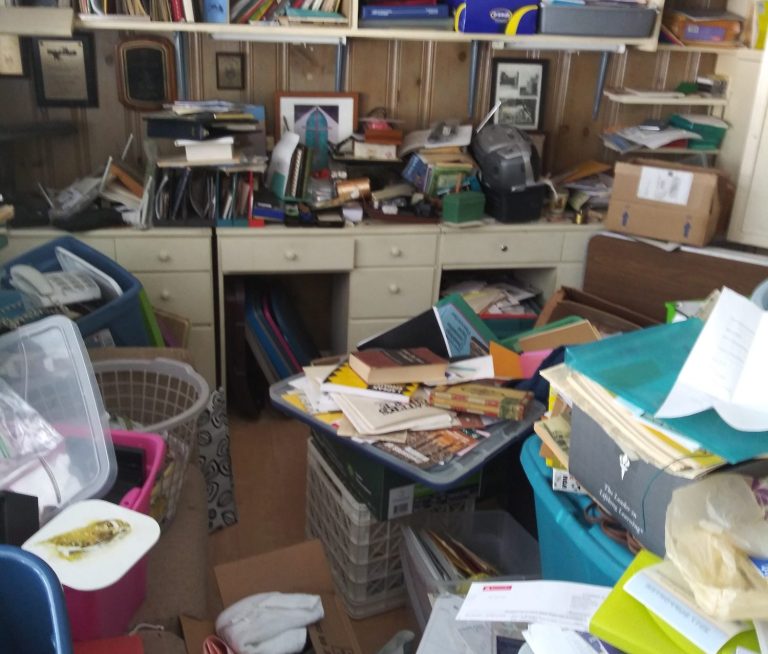The insidious creep of clutter starts with a single item out of place, but the unplanned accumulation of things quickly morphs into a suffocating presence. More than just a visual annoyance, clutter deeply impacts your cognitive function, emotional state, and overall sense of well-being. A chaotic environment can trigger feelings of stress, anxiety, and even depression, making it difficult to focus and leading to mental fatigue. Furthermore, your physical health can suffer as the disarray breeds dust, allergens, and potential hazards. Movement becomes risky, requiring constant navigation around obstacles, while the sheer volume of possessions can be overwhelming, leading to confusion and stress.
CLUTTER BE GONE!

Clutter

Decluttering is the process of removing unnecessary, unused, or unwanted items from a space in order to create a more organized, tidy, and functional environment. It applies to physical spaces (like your home or office). Starting the process of decluttering is difficult. It can be challenging and sometimes uncomfortable. Hidden within this challenging task is an opportunity for self-discovery. Sorting through your belongings, you confront the emotions associated with each item. This makes you more aware of how much you have, what you really care about, and what you might be holding onto without realizing it. You also start to see why you find it hard to let go of certain things. Letting go of clutter becomes a way to understand your habits, emotional attachments, and the stories you tell about your life.
LET'S DO THIS
Assess your readiness to declutter by evaluating your willingness to part with sentimental items. This initial soul-searching is key, as decluttering requires a certain level of detachment and a willingness to let go. Be honest about your commitment to the process, as half-hearted attempts may lead to frustration and limited progress. Decluttering is a process that requires patience and understanding, not a race.
DECLUTTER
Decluttering your space can be tough and often uncomfortable. It means making hard choices about what to keep and what to let go of. Many items we hold on to are unused, unnecessary, or no longer needed. Still, this process offers a chance to learn more about yourself. It can reveal emotional weight you carry, how much you own, what truly matters to you, and what habits you may hold onto without realizing. Sometimes, we cling to old ways without noticing. Decluttering is not just about tidying up; it’s a way to understand what shapes your life and habits.
ORGANIZING
Creating order often brings a sense of calm and control. Decluttering and organizing your space can greatly improve your overall well-being. This simple action can boost mental clarity and focus: A tidy space reduces distractions, stress, and anxiety. Creating order often brings a sense of calm and control. Improves mood and energy: The act of organizing can be energizing, and the results can lift your spirits. Enhances productivity: When everything has its place, you waste less time searching and more time doing. Strengthens decision-making skills: Choosing what to keep or toss sharpens your ability to make quick, confident decisions. Less clutter means fewer places for dust, mold, and allergens to hide, which can improve air quality and reduce asthma or allergy symptoms. Decluttering also makes your home less likely to cause falls, keeping you safer every day.

ORGANIZING
Organizing and decluttering your space is an investment in your mental and emotional well-being. Studies show that a clean and organized environment can significantly improve cognitive function, boost your mood, and contribute to an overall sense of calm and control. It's important to remember that tackling years of accumulated clutter is a journey, not a sprint; Rome wasn't built in a day, and neither was your cozy chaos. However, the effort is undeniably worthwhile. Imagine the peace of mind you'll gain, the improved focus you'll experience, and, perhaps most importantly, the newfound confidence in opening your home to loved ones without feeling a twinge of embarrassment.

Tackling clutter one space at a time offers a pathway to extend far beyond cleaning. It's a deliberate act of letting go. Concentrating our efforts on a single area, we grant ourselves the space to confront the memories and emotions of each object. This focused approach eases the process of preventing the overwhelming sensation of a full-scale decluttering project. Implementing straightforward strategies, like sorting belongings into specific categories and evaluating their usefulness, can significantly enhance the decluttering process. These manageable actions transform a potentially stressful endeavor into a series of achievable steps, ultimately paving the way for a lighter, more liberating living space.
DECLUTTER